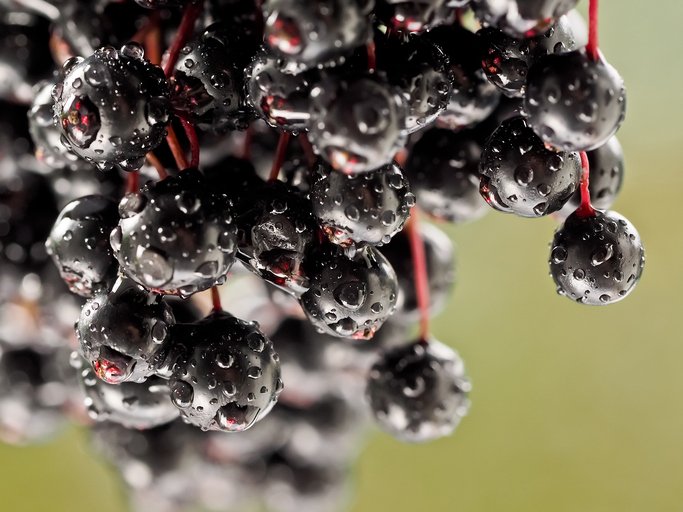Facts & Studies
What Are Elderberries?
What Are Elderberries
The recent hype on elderberries has prompted many of our prospective customers to ask the blatant question, “What are elderberries?” Sure, they’ve heard the recommendations from their doctors, read the online reviews, seen the Facebook posts of everyone asking about it but these berries are not very widely known.
So, what are elderberries?
Elderberries are the dark purple berries that grow in clusters on elder trees in Europe and North America. They are a fast growing plant which can grow up to 13 feet tall. Black elderberries have a rich history in herbal medicine and elderberry syrup is a resurging ingredient to have in your natural cold and flu medicine chest.
In the Spring, the white flowers grow on woody stalks covered with leaves. Elderflowers have a honey citrus flavor which can be used to make jellies, teas, brewed into wines, or stirred into muffins for a light, sweet flavor.
In the early Fall, the ripe berries can be made into many things including syrups, extracts, pies, jellies, jams, and cobblers.
The leaves, twigs, stems, roots, and unripe elderberries are not edible. These parts contain toxins which metabolize into cyanide. But don’t let this stop you from enjoying elderberries. Many foods we love and commonly eat also come from toxic plants, such as apples, peaches, tomatoes, and cherries.
The ripe berries can be eaten raw in small quantities but they really don’t taste good. They have an extremely low sugar content, making them taste bitter and foul. It really is best to cook them and mix with sugar or honey.
Nutritionally, elderberries contain large amounts of vitamin A and C, calcium, iron, and vitamin B6. They really are a wonder fruit! Now, the next time someone asks you about elderberries, you’ll have a great answer, and can recommend Live Berry Well products.
Elderberries and the Flu
Elderberry syrup has been gaining attention nationally and in the natural heath communities after several studies were released demonstrating the effects of elderberry syrup on the flu. One study (Roschek, et.al., 2009) focused on its ability to effectively inhibit the widespread strain of the flu.
Research also reveals that elderberry syrup prevents the common cold and the flu by inhibiting viral replication. This research also suggests that it is best taken at the very first sign of illness or just after a known exposure to someone who is sick (Kinoshita, et.al., 2012). It can also be taken in smaller doses preventively during the cold and flu season or during times of increased exposure such as holiday travel during the flu season.
A Norwegian study found elderberry syrup is a potent antiviral. 60 patients were given elderberry syrup within the first 48 hours of developing flu symptoms. Patients had both type A and type B influenza. The patients receiving elderberry were over the flu virus within an average of 4 fewer days than those with placebo. (Zakay-Rones, et al, 2004).
The same researchers almost a decade earlier studied the effects of elderberry on a known outbreak of influenza B in Panama. They evaluated elderberry intake over 6 days, measuring fever, feeling of improvement, and complete cure along with serum antibody tests. In the elderberry treatment group, over 93% of cases saw improvements in just 2 days. This is far better than the control group, which took 6 days to reach only 91.7%.Almost 90% of the treatment group was completely cured in only 2-3 days. (Zakay-Rones, et al, 1995).
Is eating elderberries or taking elderberry syrup safe?
In most cases, yes. However, with so many homemade elderberry syrup makers flooding communities, it’s important to choose brands that you trust and have demonstrated the ability to produce a high quality elderberry syrup. Unfortunately, many homemade formulas can actually worsen an illness by causing additional symptoms such as nausea or vomiting.
The elderberry plant can contain a cyanogenic glycoside sambunigrin which must be deactivated by heat prior to ingesting medicinally to avoid adverse effects. This is a serious detail in handling elderberries as a cyanogenic glycoside contains a cyanide group attached to a sugar. When digested, it is released, and can harm the body. In addition, elderberries also contain an alkaloid, sambucine, which causes nausea and vomiting.
While these are scary side effects, these components are easily deactivated through heat, which enables us to produce a finished product that does not contain any of the dangerous types of alkaloids or glycosides.
If you are making your own elderberry syrup, or other elderberry recipes, note that the berries should not be used in a tincture, glycerite, or other uncooked preparation. They are best suited for use in a syrup or gummy.
What are the Benefits of elderberries?
There are many reported benefits of elderberries. Not only are they nutritious, but many studies have shown they also fight cold and flu symptoms, support heart health and fight inflammation and infections, among other benefits.
When evaluating claims for elderberries, we always try and take the study or source into consideration. Many of these studies are done in lab testing environments, and carry the potential that elderberries may be proven to have these benefits.
Nutritional Benefits:
- Elderberries are a low-calorie food packed with antioxidants.
- High in vitamin C: There are 6–35 mg of vitamin C per 100 grams
- Elderberries contain 7 grams of fiber per 100 grams of fresh berries
- A good source of phenolic acids
- Elderberry contains the antioxidant flavonols quercetin, kaempferol and isorhamnetin
- Rich in anthocyanins, giving the berry the dark black-purple color and are a strong antioxidant with anti-inflammatory effects
Note: The exact nutritional composition of elderberries depends on the variety of plant, region in which it is grown, ripeness of the berries and environmental and climatic conditions. In addition, the preparation may also alter the nutritional benefits depending on how it’s prepared and used.
Health Benefits:
(sources: 1, 2, 3, 4, 5, 6, 7)
- Elderberries are an immune boosting food that helps reduce flu like symptoms
- High in Antioxidants – leading some studies to the conclusion they may help prevent chronic disease. (1)
- May Be Good for Heart Health (2)
Other health benefits that have limited scientific evidence are:
- May help fight cancer – Both European and American elderberries have been found to have some cancer-inhibiting properties in test-tube studies (3, 4).
- Has antiviral properties and fights harmful bacteria – Elderberry has been found to inhibit the growth of bacteria like Helicobacter pylori and may improve symptoms of sinusitis and bronchitis (5).
- May increase white blood cell count and support the immune system -In a study our of Romania the used rats as their subjects, elderberry polyphenols were found to support immune defense by increasing the number of white blood cells (6).
- May be a source of natural antidepressant – A study investigated the antidepressant activities of different parts of S. ebulus and S. nigra in male Swiss albino mice. The study found mice fed 544 mg of elderberry extract per pound (1,200 mg per kg) had improved performance and mood markers (7).

